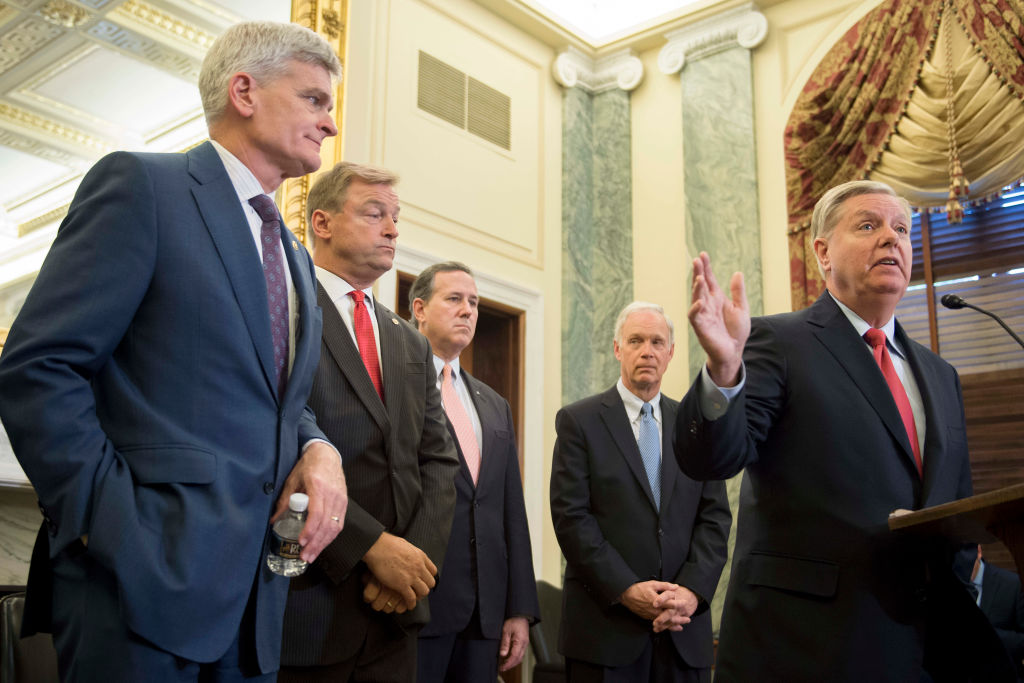A new draft of the Republican health-care bill would reportedly let Alaska and Hawaii keep ObamaCare


A free daily email with the biggest news stories of the day – and the best features from TheWeek.com
You are now subscribed
Your newsletter sign-up was successful
Republicans have just days left to repeal and replace the Affordable Care Act with only 50 votes and no Democrats. With two no votes already — Sen. Susan Collins (R-Maine) and Sen. Rand Paul (R-Ky.) — "undecided" Sen. Lisa Murkowski (R-Alaska) could cast the decisive vote against it. As a result, one Republican Senate aide told Independent Journal Review on Thursday that the bill's sponsors, Sens. Lindsey Graham (R-S.C.) and Bill Cassidy (R-La.), are potentially considering "buying" Murkowski's vote by letting her state more or less keep ObamaCare.
The draft is by no means final, nor is it certain that Murkowski would accept the revision. For her part, Murkowski has told reporters that when it comes to the Republican legislation, "what I'm trying to figure out is the impact on my state."
Independent Journal Review lists three provisions that could benefit Murkowski's state. "Alaska (along with Hawaii) will continue to receive ObamaCare's premium tax credits while they are repealed for all other states" and the draft "delays implementation of the Medicaid per capita caps for Alaska and Hawaii," IJR reports. Politico also reports of a potential "Medicaid delay" that would "apply to Alaska, Wyoming, South Dakota, North Dakota, and Montana, based on their low-density populations."
The Week
Escape your echo chamber. Get the facts behind the news, plus analysis from multiple perspectives.

Sign up for The Week's Free Newsletters
From our morning news briefing to a weekly Good News Newsletter, get the best of The Week delivered directly to your inbox.
From our morning news briefing to a weekly Good News Newsletter, get the best of The Week delivered directly to your inbox.
For the rest of America, Graham-Cassidy would convert ObamaCare's subsidies and Medicaid payments to block grants to states, allowing each state ample leeway to decide coverage rules and patient protections, plus cut Medicaid sharply and change its structure. Read the full details at IJR.
A free daily email with the biggest news stories of the day – and the best features from TheWeek.com
Jeva Lange was the executive editor at TheWeek.com. She formerly served as The Week's deputy editor and culture critic. She is also a contributor to Screen Slate, and her writing has appeared in The New York Daily News, The Awl, Vice, and Gothamist, among other publications. Jeva lives in New York City. Follow her on Twitter.
-
 5 cinematic cartoons about Bezos betting big on 'Melania'
5 cinematic cartoons about Bezos betting big on 'Melania'Cartoons Artists take on a girlboss, a fetching newspaper, and more
-
 The fall of the generals: China’s military purge
The fall of the generals: China’s military purgeIn the Spotlight Xi Jinping’s extraordinary removal of senior general proves that no-one is safe from anti-corruption drive that has investigated millions
-
 Why the Gorton and Denton by-election is a ‘Frankenstein’s monster’
Why the Gorton and Denton by-election is a ‘Frankenstein’s monster’Talking Point Reform and the Greens have the Labour seat in their sights, but the constituency’s complex demographics make messaging tricky
-
 Trump HHS slashes advised child vaccinations
Trump HHS slashes advised child vaccinationsSpeed Read In a widely condemned move, the CDC will now recommend that children get vaccinated against 11 communicable diseases, not 17
-
 FDA OKs generic abortion pill, riling the right
FDA OKs generic abortion pill, riling the rightSpeed Read The drug in question is a generic version of mifepristone, used to carry out two-thirds of US abortions
-
 RFK Jr. vaccine panel advises restricting MMRV shot
RFK Jr. vaccine panel advises restricting MMRV shotSpeed Read The committee voted to restrict access to a childhood vaccine against chickenpox
-
 Texas declares end to measles outbreak
Texas declares end to measles outbreakSpeed Read The vaccine-preventable disease is still spreading in neighboring states, Mexico and Canada
-
 RFK Jr. shuts down mRNA vaccine funding at agency
RFK Jr. shuts down mRNA vaccine funding at agencySpeed Read The decision canceled or modified 22 projects, primarily for work on vaccines and therapeutics for respiratory viruses
-
 Measles cases surge to 33-year high
Measles cases surge to 33-year highSpeed Read The infection was declared eliminated from the US in 2000 but has seen a resurgence amid vaccine hesitancy
-
 Kennedy's vaccine panel signals skepticism, change
Kennedy's vaccine panel signals skepticism, changeSpeed Read RFK Jr.'s new vaccine advisory board intends to make changes to the decades-old US immunization system
-
 Kennedy ousts entire CDC vaccine advisory panel
Kennedy ousts entire CDC vaccine advisory panelspeed read Health Secretary RFK Jr. is a longtime anti-vaccine activist who has criticized the panel of experts
